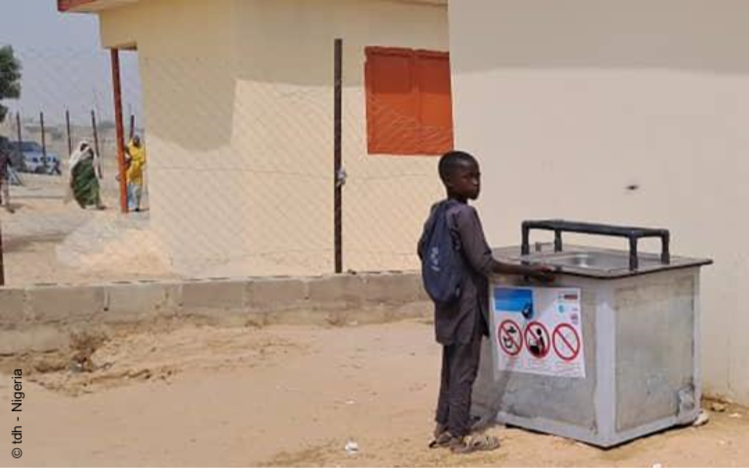The water crisis
Climate change is exacerbating droughts and changing rainfall patterns in different parts of the world, particularly in Africa. The decrease in rainfall and the scarcity of water have major consequences on the health of vulnerable populations already facing crisis situations. It is very likely that this water scarcity, aggravated by population growth and pollution of water resources, will increase massively in the coming years. According to a report published by the World Meteorological Organization in October 2021, the number and duration of droughts have increased by 29% over the past 20 years. Most drought-related deaths have occurred in Africa (1).
Access to water and health
In 2023, 2 billion people, or 26% of the world’s population, do not have access to a safe water supply and 3.6 billion, or 46% of the population, do not have access to safe sanitation (2). Every day, 1000 children die from diseases caused by lack of sanitation and hygiene. These diseases could be easily prevented if access to safe water and sanitation were provided (3).
Recently, the COVID-19 pandemic has demonstrated the critical importance of sanitation, hygiene, and adequate access to safe drinking water to prevent and control disease. According to the World Health Organization, handwashing is one of the best ways to prevent the spread of pathogens and infections, including COVID-19 (3). Yet three out of ten people worldwide did not have the opportunity to wash their hands with soap and water at home during the COVID-19 pandemic (4).

The response of "Terre des hommes"
To address the lack of water in crisis contexts, the Terre des hommes organization, in partnership with FHNW (5), Graviteau Association (6), SKAT foundation (7), Swiss TPH (8) and RANAS Limited (9), and financed by the ELRHA Humanitarian Innovation Fund (10) and the Swiss Cooperation, deploys mobile hand-washing stations on its projects that use an automatic water recycling system.
Deployed as part of a pilot project in a camp for displaced persons in Nigeria, this innovative idea has enabled more than 400 children to wash their hands every day, thereby reducing the spread of infectious diseases and limiting epidemics such as cholera or Ebola. Cases of diarrhoea and pneumonia were reduced by 50% in children who washed their hands, and 1,000 litres of water were saved each day. This experience was then replicated in other contexts (Mali, Burkina Faso) where access to sanitation facilities is limited, such as health centres, schools, and refugee camps (11). By 2023, 150 hand stations will be operational in 3 countries.
The Gravit'eau system
Gravit’eau mobile handwashing stations use a very small amount of water thanks to an automatic recycling system. Ideal for crisis and water shortage situations, Gravit’eau safely reduces water consumption by up to 99% per handwash compared to other methods. Water for hand washing is discharged by operating a foot pump. The wastewater is collected in a tank and automatically filtered by a membrane. The filtration membrane is extremely fine and does not allow bacteria or viruses to pass through. The whole system works by gravity. This technology allows water to be recycled without electricity, without complex maintenance and without continuous chemical input. In addition to hand washing, other uses for this filtration technology are being explored for larger quantities of water, including treatment of domestic wastewater used for cooking or personal hygiene (12).
Modular design and local manufacturing
The Gravit’eau handwashing station has a modular design. It can be easily adapted to the needs of different user groups, in terms of size and context. The station can be manufactured with locally available materials and only a compact and lightweight hardware kit needs to be shipped from Europe. This kit includes a membrane module, foot pump and connectors, a basic tool kit and a liquid or foam soap dispenser. A detailed manual is provided with the kit developed by the Graviteau Association. Videos and online training are also available. In the field, the Gravit`eau team organizes trainings and workshops to build the systems using locally available water containers as well as the wood, plastic or aluminium sheets commonly used for housing (12).
Handwashing is an essential activity in the prevention of contagious diseases and the spread of epidemics. The Gravit’eau system, deployed and implemented by Terre des hommes, is a major innovation that allows better access to handwashing and thus improves the sanitary conditions of the most vulnerable populations in contexts of crisis and water shortage.
Sources
(1) Wake up to the looming water crisis, report warns, 2021, WMO, Read here
(2) Imminent risk of a global water crisis (UNESCO/UN-Water), 2023, Read here
(3) Goal 6: Ensure access to water and sanitation for all, 2022, Read here
(4) Billions of people will lack access to safe water, sanitation and hygiene in 2030 unless progress quadruples – warn WHO, UNICEF, 2021, Read here
(5) Fachhochschule der Nordwestschweiz – University of Applied Sciences Northwestern Switzerland, Read here
(7) https://skat-foundation.ch/
(8) https://www.swisstph.ch/en/
(9) https://www.ranasmosler.com/
(11) Gravit’eau: washing hands with recycled water, Terre des hommes Read here
(12) Water-recycling handwashing stations, here



